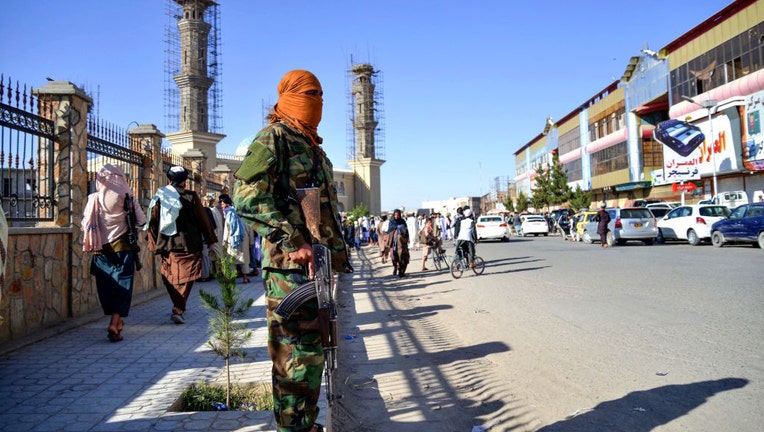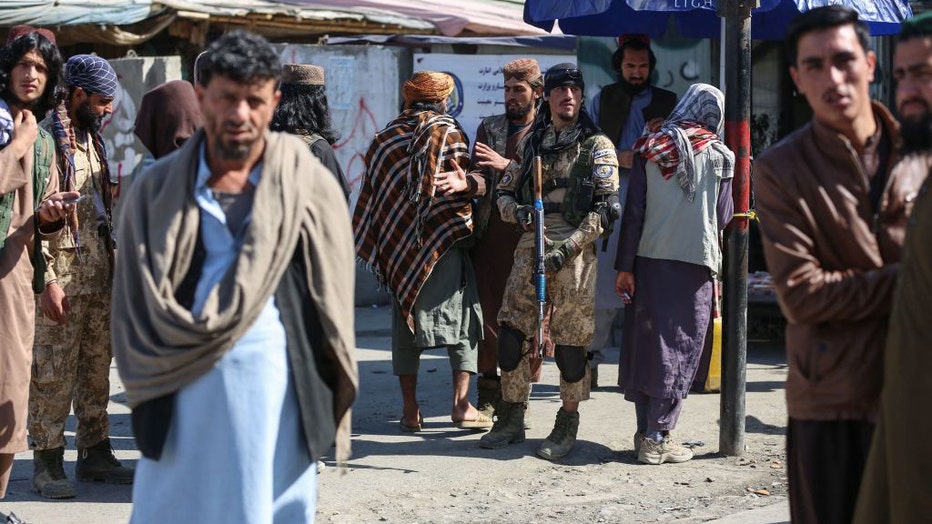UN calls on Taliban to end public executions, lashings and stonings in Afghanistan

A Taliban security personnel stands guard as Muslim devotees arrive to offer Eid al-Fitr prayers, which marks the end of the holy fasting month of Ramadan, at Omar mosque in Kandahar on April 21, 2023. (SANAULLAH SEIAM/AFP via Getty Images)
The United Nations slammed the Taliban on Monday for continuing its use of public executions, lashings and stonings since taking control of Afghanistan nearly two years ago.
According to a report by the United Nations Assistance Mission in Afghanistan, or UNAMA, 274 men, 58 women and two boys have been publicly flogged in Afghanistan over the past six months. Most punishments were in connection with convictions of adultery and running away from home. Other alleged offenses included theft, homosexuality, consuming alcohol, fraud and drug trafficking.
The U.N. has called on the Taliban to immediately suspend its executions.
"Corporal punishment is a violation of the Convention against Torture and must cease," U.N. Human Rights Chief Fiona Frazer said.
US MARINE CORPS WHO LOST LEGS IN AFGHANISTAN SAYS A NONPROFIT HELPED HIM STAY ALIVE
The Taliban foreign ministry responded by saying Afghanistan’s laws are made in accordance with Islamic rules and guidelines, and that an overwhelming majority of Afghans follow the rules, according to The Associated Press.
"In the event of a conflict between international human rights law and Islamic law, the government is obliged to follow the Islamic law," the ministry said in a statement.
The Taliban began carrying out these punishments after gaining power in the country in 2021. The terror group had initially committed to a more moderate rule compared to their previous time in power in the 1990s.

Afghan men and Taliban security personnel stand guard along a road. (SHAFIULLAH KAKAR/AFP via Getty Images)
The leaders have also gradually tightened restrictions on women, banning them from public places like parks and gyms in accordance with its interpretation of Islamic law. The restrictions have prompted international outrage, leading to the country’s increased isolation amid a collapsed economy and worsening humanitarian crisis.
Monday's U.N. report details the Taliban's practices before and after their ascend to power two years ago when they seized the capital of Kabul as U.S. and NATO forces withdrew after a 20-year war.
TALIBAN TAKE OVER AFGHANISTAN: WHAT WE KNOW AND WHAT'S NEXT
The first public flogging after the takeover was reported in October 2021 in the northern Kapisa province, according to the U.N. report. A woman and man convicted of adultery were publicly lashed 100 times each in the presence of religious scholars and local Taliban authorities.
Taliban authorities executed an Afghan convicted of murder in December 2022 in the first public execution since the group returned to power, the report said. The execution was carried out with a rifle by the victim’s father in the western Farah province in front of hundreds of spectators and top Taliban officials.
Top government spokesman Zabihullah Mujahid said the decision to carry out the punishment was "made very carefully" following approval by three of the country’s highest courts and the Taliban supreme leader, Mullah Hibatullah Akhundzada.
BIDEN ADMINISTRATION SET TO EXTEND STAY OF AFGHAN EVACUEES
The report said there has been a sharp increase in the number and regularity of judicial corporal punishment since November, when Mujahid echoed comments by the supreme leader about judges and their use of Islamic law.
The Taliban’s appointed Deputy Chief Justice Abdul Malik Haqqani said in a video message last week that the terror group's Supreme Court has issued 175 so-called retribution verdicts, including 79 floggings and 37 stonings, since returning to power.
These verdicts establish the right of an alleged victim or relative of a victim of a crime to punish or forgive the perpetrator.
After its initial overthrow in the U.S. invasion of Afghanistan in 2001, the Taliban continued to carry out corporal punishment and executions in areas under its control while waging an insurgency against the U.S.-backed former Afghan government, the report said.
UNAMA documented at least 182 incidents in which the Taliban carried out its own sentences during the height of its insurgency between 2010 and August 2021. This led to 213 deaths and 64 injuries.
U.N. Secretary-General Antonio Guterres has called the Taliban's ban on women working an unacceptable violation of Afghan human rights.
The Taliban rulers informed the United Nations last month that Afghan women employed with the U.N. mission could no longer work. The Taliban previously banned girls from going to school after the sixth grade and women from most public life and work. The group in December banned Afghan women from working at local and non-governmental groups, which did not apply to U.N. offices at the time.
When the Taliban was in power from 1996 to 2001, public corporal punishment and executions were carried out by officials against individuals convicted of crimes. They were often done in large venues like sports stadiums and at urban intersections.
The Associated Press contributed to this report.

